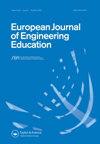Student perceptions of remote learning transitions in engineering disciplines during the COVID-19 pandemic: a cross-national study
IF 2.8
Q2 EDUCATION & EDUCATIONAL RESEARCH
引用次数: 4
Abstract
ABSTRACT This study captures student perceptions of the effectiveness of remote learning and assessment in two associated engineering disciplines, mechanical and industrial, during the COVID-19 pandemic in a cross-national study. A structured questionnaire with 24 items on a 5-point Likert scale was used. Parallel and exploratory factor analyses identified three primary subscales. The links between student perceptions and assessment outcomes were also studied. There was a clear preference for face-to-face teaching, with the highest for laboratories. Remote live lectures were preferred over recorded. Although students found the switch to remote learning helpful, group work and communication were highlighted as concern areas. Mean scores on subscales indicate a low preference for remote learning (2.23), modest delivery effectiveness (3.05) and effective digital delivery tools (3.61). Gender effects were found significant on all subscales, along with significant interactions with university and year-group. Preference for remote delivery of design-based modules was significantly higher than others.在COVID-19大流行期间,学生对工程学科远程学习转变的看法:一项跨国研究
本研究在一项跨国研究中捕捉了学生对2019冠状病毒病大流行期间机械和工业两个相关工程学科远程学习和评估有效性的看法。采用5点李克特量表,共24个项目的结构化问卷。平行和探索性因素分析确定了三个主要子量表。学生的看法和评估结果之间的联系也进行了研究。学生们明显倾向于面对面教学,其中实验室教学的比例最高。远程直播讲座比录制讲座更受欢迎。虽然学生们发现远程学习很有帮助,但小组工作和交流是重点关注的领域。子量表的平均得分表明,学生对远程学习的偏好较低(2.23),教学效果适中(3.05),有效的数字教学工具(3.61)。性别影响在所有子量表上都很显著,在大学和年级组之间也有显著的相互作用。对远程交付基于设计的模块的偏好明显高于其他。
本文章由计算机程序翻译,如有差异,请以英文原文为准。
求助全文
约1分钟内获得全文
求助全文
来源期刊

European Journal of Engineering Education
EDUCATION & EDUCATIONAL RESEARCH-
CiteScore
7.30
自引率
13.00%
发文量
64
期刊介绍:
European Journal of Engineering Education is published six times a year in print and electronic editions and provides an essential forum for dialogue between researchers and specialists in the field of engineering education, at European and worldwide levels. European Journal of Engineering Education is the Official Journal of SEFI, the Socièté Européenne pour la Formation des Ingénieurs (the European Society for Engineering Education). SEFI is a non-governmental organization whose aims are to develop information about engineering education, to improve communication and exchange between professors, researchers and students and to promote cooperation between the various institutions concerned with engineering education.
 求助内容:
求助内容: 应助结果提醒方式:
应助结果提醒方式:


